|
|
|
Sort Order |
|
|
|
Items / Page
|
|
|
|
|
|
|
| Srl | Item |
| 1 |
ID:
117857


|
|
|
|
|
| Publication |
2012.
|
| Summary/Abstract |
The role of small states has been largely neglected in research on the process and outcome of multilateral negotiations. Even though these states may be active in the agenda-setting processes or display a specific engagement in certain thematic aspects of negotiations, in the end game the outcome of negotiations has been perceived to be dependent on the bargaining between major powers. However, small states also have strategies at their disposal to compensate for these weaknesses. Two principal ones come to mind, prioritization or niche diplomacy, and coalition-building to join forces with like-minded states in order to draw on their resources, expertise and manpower. In the article, we compare two cases of small state coalitions in multilateral negotiations, namely the Like Minded (LM) group in the negotiations that led to the establishment of the International Criminal Court (ICC), and the Alliance of Small Island States (AOSIS) in United Nations climate negotiations. While the two coalitions resort to similar strategies, they have not been comparably successful. We will show that the ability to translate discursive power into measurable effects on outcomes ultimately depends on the institutional setting of the negotiations and the nature of the issue that coalitions are tackling.
|
|
|
|
|
|
|
|
|
|
|
|
|
|
|
|
| 2 |
ID:
102433
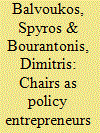

|
|
|
|
|
| Publication |
2011.
|
| Summary/Abstract |
Chairs have a significant potential effect on the bargaining structure and conduct of multilateral negotiations, addressing collective action problems that arise in decentralised bargaining. We examine the role of the Chair as a policy entrepreneur in multilateral negotiations, identifying the parameters that increase the Chair's entrepreneurship potential and condition the outcome of the Chair's entrepreneurial activities. We cluster the identified parameters in three groups of organisational attributes, comprising the Chair's mandate, available resources and (formal) constraints, in particular decision-making rules. We use this typology to analyse four important case studies within the UN setting.
|
|
|
|
|
|
|
|
|
|
|
|
|
|
|
|
| 3 |
ID:
152426


|
|
|
|
|
| Summary/Abstract |
China is one of the most signifi cant players in the South China Sea and its activities, policies and strategies have always had a deep impact on the Asia–Pacifi c region. Leishangthem Bimolchand Singh analyses China’s position and assertive moves over the issue as well as its response to the recent arbitral tribunal’s ruling on the South China Sea.
|
|
|
|
|
|
|
|
|
|
|
|
|
|
|
|
| 4 |
ID:
120720
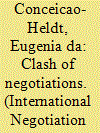

|
|
|
|
|
| Publication |
2013.
|
| Summary/Abstract |
Abstract While the number of preferential trade agreements (PTA) has increased rapidly in recent years, the Doha round of multilateral trade negotiations has been deadlocked since 2006. Most PTAs were even concluded after the start of the Doha round. Does the shift to PTAs "marginalize" the multilateral system? And is there a clash between preferential and multilateral trade liberalization? To answer these questions, we build upon negotiation analysis literature, arguing that the proliferation of PTAs draws negotiating capacity away from the multilateral level and thus reduces the incentives to agree on multilateral trade agreements. The willingness of actors to move from their initial bargaining positions and make concessions at the multilateral level depends on their outside options, that is, their best or worst alternatives to a negotiated agreement. The more credible an actor's argument that he has a good alternative to multilateralism, the greater his bargaining power will be. In order to support the argument we will analyze the negotiation process at the multilateral level and link it to PTAs under negotiation by the EU, US, Brazil, Australia, and India.
|
|
|
|
|
|
|
|
|
|
|
|
|
|
|
|
| 5 |
ID:
167868
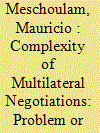

|
|
|
|
|
| Summary/Abstract |
Education in International Relations requires continual evolution. One approach is the use of negotiation simulations for complex issues. Despite the extensive literature on the subject, there is a lack of qualitative research on this approach, particularly in Latin America and Mexico. This paper presents the findings of a qualitative research on five simulations with Mexican students. The five exercises were characterized by the application of elements that are not usually included in traditional simulations, such as a multiweek phase of prior negotiations, the use of Twitter, the introduction of nonstate actors, a gala dinner, and a continuous feed of real world news. We investigated 118 participants through 30 in depth interviews analyzed with NVivo, a systematized analysis of 118 reports, documents and tweets, and a pre-post questionnaire applied to the fifth group. The results in the five simulations were highly positive. The students reported a greater awareness of the complexity of international negotiations. Such awareness can present both a risk and an opportunity: a risk because those circumstances caused discouragement and frustration in many participants, and an opportunity because those same circumstances, properly channeled, triggered parallel skills, and creative thinking. Therefore, the role of the facilitation team was fundamental.
|
|
|
|
|
|
|
|
|
|
|
|
|
|
|
|
| 6 |
ID:
102496


|
|
|
|
|
| Publication |
2011.
|
| Summary/Abstract |
The international community has been trying to find a comprehensive and effective solution to the problem of anthropogenic climate change for well over two decades. The fundamental problem posed by climate change is that any solution, if it is to be effective, requires collectively agreed upon global initiatives. If enough countries do not take sufficient action, any collective endeavors to mitigate the problem will be less effective or may even fail. As a result, mitigating climate change requires a high level of international cooperation. In the climate change arena, negotiators spent much of 2007 searching for common ground and securing universal participation in a new global regime to take effect when the first commitment period under the UN Framework Convention on Climate Change's Kyoto Protocol expires at the end of 2012. This article examines one of the strategies used to address this challenge in the lead up to the December 2007 Climate Change Conference in Bali, Indonesia: a variation of track-two diplomacy, where climate change was addressed at numerous workshops and high-level meetings to enable parties to the 1992 United Nations Framework Convention on Climate Change and the 1997 Kyoto Protocol to create space for building trust and exploring innovative solutions in determining whether or not to embark on negotiations on a post-2012 regime.
|
|
|
|
|
|
|
|
|
|
|
|
|
|
|
|
| 7 |
ID:
182568
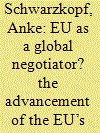

|
|
|
|
|
| Summary/Abstract |
This paper aims to account for the EU’s role in multilateral negotiations at the UNGA by looking at the negotiations on the enhanced observer status. During the negotiation process, the EU experienced significant opposition and had to accept an intermediate setback in form of a postponement of the vote. Despite this, the EU’s enhanced observer status was adopted by the UNGA in May 2011 as resolution 65/276. This research contributes to the understanding of the EU as an actor in multilateral negotiations and the interaction between state and non-state actors. I argue that the EU is in the process of establishing itself as an active and recognized actor at the UN and determining its role as a highly integrated regional organization and non-state entity in the state-centric environment of the UNGA. I analyse the negotiation process and the final agreement through the lenses of a bargaining approach and as an alternative, mutual recognition as global justice.
|
|
|
|
|
|
|
|
|
|
|
|
|
|
|
|
| 8 |
ID:
179148
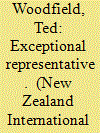

|
|
|
|
|
| Summary/Abstract |
Ted Woodfield reflects on Mike Moore's trade negotiation legacy.
|
|
|
|
|
|
|
|
|
|
|
|
|
|
|
|
| 9 |
ID:
135058


|
|
|
|
|
| Summary/Abstract |
Despite its growing status as an ‘emerging’ power, perceptions of India’s current and future role in multilateral organisations continue to be overshadowed by its reputation for blocking rather than supporting progress in multilateral negotiations on grounds of national sovereignty and Third Worldism. In this article we suggest a more positive interpretation of India’s role through a close analysis of its diplomacy during the 2001 Doha Ministerial Conference of the World Trade Organisation (wto). The Indian delegation attempted proactively to shape the agenda of the negotiations and to promote a form of developmental multilateralism that might correct the perceived imbalances within the substantive commitments to and structure and processes of the wto. India failed to get its way at the time, but the ongoing deadlock at Doha demonstrates the continuing salience of such alternative conceptions of global justice.
|
|
|
|
|
|
|
|
|
|
|
|
|
|
|
|
| 10 |
ID:
129912
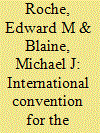

|
|
|
|
|
| Publication |
2014.
|
| Summary/Abstract |
Cyber weapons now are an extension of state power. In hopes of gaining a strategic advantage, many countries including the United States, Russia and China are developing offensive cyber capabilities to disrupt political, economic, and social institutions in competitor nations. These activities have led to a cyber arms race that is spiraling out of control. This imminent global threat challenges the international community to be proactive. The purpose of this article is to propose an international convention to throttle the development, proliferation and use of cyber weapons before they cause electronic Armageddon. We begin by examining three successful efforts in arms control and use the lessons learned to draft a convention that can serve as a starting point for formal multilateral negotiations.
|
|
|
|
|
|
|
|
|
|
|
|
|
|
|
|
| 11 |
ID:
139393


|
|
|
|
|
| Summary/Abstract |
High issue salience and controversy negatively affect the probability of success of multilateral negotiations. In such a context, Chairpersons acquire an important role in agenda management and brokerage among the bargaining partners. If they perform these functions neutrally and impartially, Chairs increase their effectiveness and emerge as key determinants of negotiation success. However, Chairs as agents often seek some degree of autonomy to pursue their own interests. We expect high issue salience and controversy to create a non-conducive environment for Chairs to follow their own agenda, due to greater principals’ sensitivity, thus leading any such autonomy-seeking attempt to failure. We discuss four case studies of negotiations taken from the un setting, in which Chairs sought autonomy in a highly polarized and controversial bargaining environment. Whereas in the first two cases, the Chairs’ attempts ended in failure confirming our basic hypothesis, in the latter two cases the Chairs were successful.
|
|
|
|
|
|
|
|
|
|
|
|
|
|
|
|
| 12 |
ID:
115980
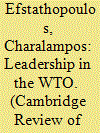

|
|
|
|
|
| Publication |
2012.
|
| Summary/Abstract |
The Doha round of multilateral negotiations has witnessed the relocation of Southern powers towards the core of the World Trade Organization (WTO) decision-making structure. Brazil and India are the only developing countries that have participated consistently in all major ministerial phases of the Doha round between 2001 and 2008. Their consolidation as trading powers cannot be attributed solely to their status as emerging economies. Their projected legitimacy as representatives of the global South has operated as a catalyst in facilitating their relocation. In various phases of negotiations, however, Brazil and India have refrained from playing a proactive role in driving negotiations forward. Their defensive stance has raised questions about the two countries' prospects for systemic leadership in world trade. In explaining this condition, this article will argue that Brazilian and Indian trade diplomacy is consistently directed towards maintaining broad bases of followership. Brazil and India are disposed to exercise assertive leadership only when that accommodates the expectations and preferences of their followership in the global South. Their preoccupation with constantly reasserting their Third World image often renders blocking agreement the preferable strategy to avoid paying a high price in terms of legitimacy.
|
|
|
|
|
|
|
|
|
|
|
|
|
|
|
|
| 13 |
ID:
172318
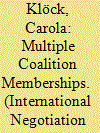

|
|
|
|
|
| Summary/Abstract |
This study explores multiple coalition memberships in multilateral negotiations, with a focus on climate negotiations. Why do countries engage in multiple coalitions, and how do multiple coalition memberships affect their influence? I argue that coalitions differ in important respects. Accordingly, countries may belong to both, long-term and short-lived coalitions; they may consciously decide to join a coalition, but also be associated by default. Finally, larger coalitions confer numerical strength, while smaller (sub-)coalitions help voice common positions. Regarding effects, I propose two perspectives. The zero-sum perspective highlights coordination costs and potentially incompatible positions, while the win-win perspective focuses on the complementarity of different coalitions and the potential for mutual support. Anecdotal evidence from the climate negotiations offers support for these perspectives, but further empirical research is needed to better understand why countries join several coalitions, how they navigate these multiple coalition memberships, and how these affect their influence.
|
|
|
|
|
|
|
|
|
|
|
|
|
|
|
|
| 14 |
ID:
090423


|
|
|
|
|
| Publication |
2009.
|
| Summary/Abstract |
The notion of providing special and differential treatment to developing countries has a long history in the World Trade Organization, but some commentators continue to question its rationale and practical effectiveness in supporting development and integration into the multilateral trading system. In particular, while operationalizing special and differential treatment is one of the important tasks of negotiators in the ongoing Doha Round, some argue that this will not only be difficult, but in fact impossible to achieve. Doubtless, special and differential treatment cannot of itself solve the problems of the developing world, and relying too heavily on this kind of discrimination will ultimately disadvantage developing country WTO members. Nevertheless, in achieving a successful conclusion to the Doha Round, members must take greater account of the different needs of developing countries and adopt more concrete provisions in this regard than are currently contained in the Uruguay Round agreements.
|
|
|
|
|
|
|
|
|
|
|
|
|
|
|
|
| 15 |
ID:
113956


|
|
|
|
|
| Publication |
2012.
|
| Summary/Abstract |
How does the agenda management process influence the effectiveness of multilateral trade talks in the World Trade Organization (WTO)? How can the all-important agenda be shaped so as to enhance the prospects of an agreement being reached? How the agenda is managed directly affects the negotiation process which follows and the eventual outcome. Yet researchers have paid little attention to the particular dynamics and challenges of agenda management in large-scale multilateral negotiations, and actual practice points to several weaknesses. This article proposes that the complexity of the agenda in multilateral talks needs to be managed and reduced in procedurally just ways if a successful outcome (agreement) is to result. It develops an analytical framework of agenda management in multilateral negotiations and conducts a structured focused comparison to explain the differences in outcomes of two rounds of WTO negotiations: the failure of the 2003 Cancún Ministerial Conference and the success of the 2004 Geneva negotiations in reaching an agreement. The findings support the proposition that a successful outcome depends in part on reducing agenda complexity and that this needs to be achieved in procedurally acceptable (if not just) ways.
|
|
|
|
|
|
|
|
|
|
|
|
|
|
|
|
| 16 |
ID:
117859


|
|
|
|
|
| Publication |
2012.
|
| Summary/Abstract |
There are many small states in the international system, which have considerably fewer capacities than their bigger counterpart. The study of multilateral negotiations in the European Union (EU), conferences taking place under the umbrella of the United Nations (UN), negotiations on the set up of an International Criminal Court (ICC), as well as the compliance bargaining in the World Trade Organisation (WTO) reveals that small states can sometimes be very influential-despite their size. Small states tend to be most likely to punch above their weight if the negotiations take place in an institutionalised arena with majority-based decision-making rules in which each state has one vote or in contexts in which decisions are made unanimously, if they are selective in negotiations and concentrate their capacities on the most important issues, engage in capacity-building activities to maximise their ideational resources, if they make use of institutional opportunity structures such as chairing meetings and engaging in agenda-setting, and if they individually or collectively apply persuasion strategies from early on.
|
|
|
|
|
|
|
|
|
|
|
|
|
|
|
|
| 17 |
ID:
127863


|
|
|
|
|
| Publication |
2013.
|
| Summary/Abstract |
In a sign of rising frustration among states without nuclear weapons at the slow pace of disarmament efforts, the UN's disarmament committee in New York passed a resolution in November with the support of 129 states calling for the "urgent" start of multilateral negotiations to eliminate nuclear weapons and designating Sept. 26 as the international day for their "total elimination." "Our delegations joined the call of the overwhelming majority of states for more urgency, focus, and new momentum for nuclear disarmament," Ireland's representative said after the Nov. 4 vote, also speaking on behalf of Austria, Liechtenstein, Malta, New Zealand, and San Marino.
|
|
|
|
|
|
|
|
|
|
|
|
|
|
|
|
|
|
|
|
|